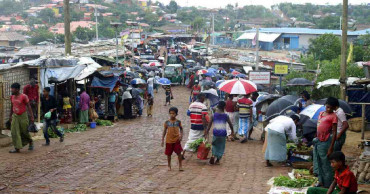UN refugee agency
EU allocates €300,000 in humanitarian aid to gutted Cox’s Bazar Rohingya camps
In response to the recent fire in one of the refugee camps, hosting nearly 1 million Rohingya refugees in Cox’s Bazar, the European Union has released €300 000 to assist the affected population.
The incident left over 5 000 people without shelter.
The funding will serve to provide immediate emergency assistance to address the most urgent needs, notably in terms of shelter, water and site development, said the EU Embassy in Dhaka on Tuesday.
It will be implemented by the UN Refugee Agency (UNHCR) and complement efforts of other humanitarian partners.
Read: Rohingya youth murdered over camp dominance in Cox’s Bazar
In the early hours of 7 January, a large fire broke out in one of the most congested camps, Camp 5, where it quickly spread. Close to 950 shelters burned down or were partially destroyed.
The fire also damaged communal facilities, including one health centre, 15 learning centres, as well as numerous latrines and washrooms.
Despite the extensive damage, no casualties have been reported so far, thanks to the rapid intervention of the fire brigade with the essential help of Rohingya community volunteers.
Since fires are frequent in the congested camps, EU-funded disaster preparedness programmes have helped humanitarian partners strengthen camp structures and better prepare for such risks.
Read: A fire in a Rohingya refugee camp in Bangladesh guts more than 1,000 shelters
This new funding comes in addition to the over €38 million provided by the EU last year in humanitarian aid to Bangladesh, notably in response to the Rohingya refugee crisis, but also to reduce the impact of natural hazards.
Last March, when another devastating fire caused substantial damage in Cox’s Bazar camps, the EU released €1 million to assist the affected refugees.
2 years ago
'This shocking ordeal and tragedy must not continue'
The UN refugee agency, has said some 190 desperate people are on the verge of perishing at sea, adrift somewhere between the Andaman Sea and the Bay of Bengal as pleas to rescue and disembark them are continuously ignored.
Reports indicate those onboard have now remained at sea for a month in dire conditions with insufficient food or water, without any efforts by States in the region to help save human lives.
Many are women and children, with reports of up to 20 people dying on the unseaworthy vessel during the journey.
Read more: Trawler capsize: 29 Rohingya refugees among 33 detained en route to Malaysia
All states have a responsibility to rescue those on the boat and allow them to safely disembark in line with legal obligations and in the name of humanity, according to a media release received from Bangkok on Friday.
"This shocking ordeal and tragedy must not continue. These are human beings – men, women and children. We need to see the states in the region help save lives and not let people die," said Indrika Ratwatte, UNHCR director for Asia and the Pacific.
Since the first reports of the boat being sighted in Thai waters, the UNHCR has received unverified information of the vessel being spotted near Indonesia and then subsequently off the coast of the Andaman and Nicobar Islands of India. The boat's current location is reportedly once more back eastwards, in the Andaman sea north of Aceh.
The UNHCR repeatedly asked all countries in the region to make saving lives a priority. The agency had alerted the Indian marine rescue centre earlier this week, requesting immediate action to save lives and allow for disembarkation.
"It is devastating to learn that many people have already lost their lives, including children," said Ratwatte. "Sadly, this makes it one of the deadliest years in the seas in the region."
Read more: UNHCR raises concerns over Afghan refugees forced returns from Tajikistan
It is very hard for the UNHCR to verify this information, but if true this will take the number of dead and missing in the Bay of Bengal and the Andaman Sea to nearly 200 this year, the UN agency said.
This is a shocking number that represents around 10 percent of the estimated 2,000 people who have taken risky sea journeys in the region in 2022.
3 years ago
Forced displacement hit record high in 2021, very few able to go home
The number of people displaced by conflict, violence, persecution and human rights abuses rose for the tenth straight year in 2021 to reach the highest level since records began, according to the latest Global Trends report released Thursday by UNHCR, the UN Refugee Agency.
“Either the international community comes together to take action to address this human tragedy, resolve conflicts and find lasting solutions, or this terrible trend will continue,” said United Nations High Commissioner for Refugees, Filippo Grandi.
Since the start of this year, the Russian invasion of Ukraine has pushed the number of forcibly displaced people worldwide to over 100 million.
But according to the detailed data in the report, last year’s numbers were already at record levels.
At the end of 2021, the number of people forced to flee their homes reached 89.3 million, up 8 per cent over the year before and well over double the figure of 10 years ago.
That figure included a record 27.1 million refugees and 53.2 million internally displaced people (those who fled their homes but remained inside their country).
READ: Possible security threats likely to complicate Rohingya crisis: Experts
The number also included 4.4 million Venezuelans displaced abroad and 4.6 million asylum seekers.
Last year’s increase was fueled by new and existing emergencies, including events leading to the Taliban takeover of Afghanistan in August, which caused widespread displacement within the country and across borders.
Conflict in the Tigray region of Ethiopia forced at least 2.5 million people to flee within the country, with some 1.5 million returning to their homes later in the year.
In Myanmar, a military takeover in February 2021 caused violence that forced many to flee, while the number of Venezuelans displaced abroad grew by more than 500,000 last year.
Of the estimated 1.4 million refugees in need of resettlement in 2021 – including children and adolescents, survivors of torture and violence, and older people – 57,500 were given homes in new countries.
That was 67 per cent higher than in 2020, but still far below pre-pandemic levels and only 4 per cent of the total requiring resettlement.
Countries made some strides in integration in 2021, with an estimated 56,700 refugees from 161 different countries of origin naturalized in 23 host countries, which represented a return to pre-pandemic levels.
The number of internally displaced people (IDPs), who make up roughly 60 per cent of all those forced to flee their homes, also reached a record high last year, with Syria, Colombia, the Democratic Republic of the Congo, Yemen, Ethiopia and Afghanistan continuing to experience the highest levels of internal displacement.
READ: 7 Rohingyas illegally entered from India held in Cox’s Bazar
In 2021, IDP returns increased to reach pre-pandemic levels, with an estimated 5.3 million people returning during the year. However, many countries – including the DRC, Cameroon, Iraq and South Sudan – saw a drop in the number of people able to go home.
3 years ago
Record 100 million people forcibly displaced worldwide: UNHCR
The Ukraine war and other conflicts pushed the number of people forced to flee conflict, violence, human rights violations and persecution over the staggering milestone of 100 million for the first time on record, the UN Refugee Agency (UNHCR) has said.
“One hundred million is a stark figure -- sobering and alarming in equal measure. It’s a record that should never have been set,” said UN High Commissioner for Refugees, Filippo Grandi on Sunday.
Also read:UNHCR, partners call for sustained funding, support for Rohingyas
“This must serve as a wake-up call to resolve and prevent destructive conflicts, end persecution, and address the underlying causes that force innocent people to flee their homes”.
According to UNHCR, the number of forcibly displaced people worldwide rose to 90 million by the end of 2021, propelled by new waves of violence or protracted conflict in countries including Ethiopia, Burkina Faso, Myanmar, Nigeria, Afghanistan and the Democratic Republic of the Congo.
In 2022, the war in Ukraine has displaced 8 million within the country this year and forced around 6 million to leave the nation.
Staggering record
100 million people forcibly displaced worldwide represents 1% of the global population and is equivalent to the 14th most populous country in the world.
The number includes refugees and asylum seekers as well as the 53.2 million people displaced inside their borders by conflict.
“The international response to people fleeing war in Ukraine has been overwhelmingly positive,” Grandi added. “Compassion is alive, and we need a similar mobilization for all crises around the world. But ultimately, humanitarian aid is a palliative, not a cure. To reverse this trend, the only answer is peace and stability so that innocent people are not forced to gamble between acute danger at home or precarious flight and exile”.
Last week, the International Organization for Migration informed that a record 59.1 million people were displaced within their homelands last year, four million more than in 2020.
Also read:UNHCR seeks steps to improve wellbeing of Myanmar refugees in Thailand
Conflict and violence triggered 14.4 million internal displacements in 2021, a nearly 50 per cent increase over the previous year.
Meanwhile, weather-related events such as floods, storms and cyclones resulted in some 23.7 million internal displacements in 2021, mainly in the Asia-Pacific region.
3 years ago
UNHCR, partners call for sustained funding, support for Rohingyas
As the Rohingya refugee response in Bangladesh is well advanced in its 5th year, UNHCR, the UN Refugee Agency, and partners have called once more on the global community to provide sustained support for the Rohingyas and the Bangladeshi communities hosting them.
The 2022 Joint Response Plan (JRP) for the Rohingya Humanitarian Crisis is being launched on Tuesday.
To support approximately 1.4 million people, including over 918,000 Rohingya refugees in Cox’s Bazar and Bhasan Char, and around 540,000 Bangladeshis in neighbouring communities, this year’s JRP sought funds of over USD 881 million.
Read: 57 Rohingyas rescued while being trafficked to Malaysia; 2 held
Under the leadership of the Bangladeshi authorities, the JRP’s response for 2022 brings together the activities of 136 partners, of which 74 are Bangladeshi organizations. It also recognizes the significant contributions of the refugees themselves to the response.
The Government of Bangladesh, supported by the international community, has generously hosted Rohingya refugees for decades. At a time when global displacement continues to rise, UNHCR and partners are emphasizing the need to ensure that the Rohingya situation does not become a forgotten crisis.
It is therefore vital to ensure continued funding and support to meet the needs of refugees and surrounding host communities, according to UNHCR.
Given their location and geography, the refugee camps in Cox’s Bazar are especially vulnerable to natural disasters. This year’s JRP accordingly highlights the need for enhanced efforts towards disaster risk management and climate change mitigation, including through reforestation and energy interventions.
The solutions to this humanitarian situation ultimately lie within Myanmar. Many Rohingya refugees continue to express their desire to return home when conditions allow. UNHCR and partners continue to maintain a presence in Rakhine State to support Myanmar to create the conditions that would be conducive for such returns. The steadfast support from the international community has been, and will be, crucial in delivering lifesaving protection and assistance services for Rohingya refugees, until they are able to return voluntarily, safely, and with dignity.
Read: Sustainable solution of Rohingya issues lies on repatriation: FS
While they are in Bangladesh, it is important that Rohingya refugees are able to live safe and dignified lives, and that they can develop the skills and capacities that could support their sustainable return in the future.
For the first time, the JRP also includes humanitarian activities on Bhasan Char, where over 24,000 Rohingya refugees have been relocated to date by the Government of Bangladesh. It is critical to continue to scale up essential humanitarian services on the island, including in the areas of health, protection, nutrition, education, and livelihoods and skills building.
The virtual JRP launch event was jointly co-hosted by the Government of Bangladesh, the International Organization for Migration (IOM) and UNHCR.
3 years ago
UN refugee agency: nearly 120,000 Ukrainians have fled
Nearly 120,000 people have so far fled Ukraine into Poland and other neighboring countries in the wake of Russian invasion, the U.N. refugee agency said on Saturday.
The number was going up fast as Ukrainians grabbed their belongings and rushed to escape from a deadly Russian onslaught on their nation, including an attempt to take the capital.
Poland has declared its border open to fleeing Ukrainians, even for those without official documents.
On Saturday a government official also said that the country sent a hospital train that will pick up those wounded in the war in Mostyska, in western Ukraine, and bring them to Warsaw for treatment.
The hospital train departed the border town of Przemysl and has five carriages adapted to transport the wounded and four stocked with humanitarian aid for Ukraine’s Lviv district.
Read: Ukraine: Curfew extended as Russian troops press on capital
Some Ukrainian men were also reportedly heading back into Ukraine from Poland to take up arms against the Russian forces.
They were exceptions, though, in what was primarily an exodus from Ukraine.
“Almost 116,000 have crossed international borders as of right now. This may go up, it’s changing every minute,” said Shabia Mantoo, the spokeswoman of the U.N. High Commissioner for Refugees. “It’s very fluid and changing by the hour.”
The agency expects up to 4 million Ukrainians could flee if the situation deteriorates further.
Those arriving were mostly women, children and the elderly after Ukrainian President Volodymyr Zelenskyy on Thursday banned men of military age from leaving the country.
Mantoo said most were heading to neighboring Poland, Moldova, Hungary, Romania and Slovakia, and even some into Belarus — from which some Russian forces entered Ukraine.
She did not immediately have details on numbers by country, but by far the largest numbers were arriving in Poland, where some 2 million Ukrainians have already settled to work in recent years, driven away by Russia’s first incursions into Ukraine in 2014 and seeking opportunities in the booming economy of the European Union neighbor.
Read: Ukraine minister:198 killed, 1000 wounded
Poland’s government said Saturday morning that more than 100,000 Ukrainians had crossed the Polish-Ukrainian border in the past 48 hours.
At the Medyka border crossing, a line of vehicles waiting to enter Poland stretched 15 kilometers (9 miles) into Ukraine, according to people crossing the border, Polish broadcaster TVN24 reported.
4 years ago
Bangladesh urged to improve security in Rohingya camps
UNHCR, the UN refugee agency, has urged Bangladesh to take immediate measures to improve the security in the Rohingya camps, saying that it is "extremely concerned" by another violent attack there.
"UNHCR is extremely concerned by another violent attack in the Rohingya refugee camps in Bangladesh," said the UN agency in a statement issued Friday night.
Read: Gun attack on madrasa in Cox’s Bazar Rohingya camp; 7 dead
This incident, which took place in the early morning, resulted in the death of at least seven refugees and an unspecified number of injured, including children, it said.
Those with injuries are now receiving medical care.
Read: Killings in Rohingya camp to disrupt repatriation: Foreign Minister
The UNHCR also sought arrest and prosecution of those responsible for instigating and committing these violent attacks in accordance with the law.
"Rohingya refugees fled to Bangladesh seeking safety and security from violence. A large majority – some 80 per cent – are women and children," the UN agency said.
4 years ago
Poor host communities fume as Rohingyas start grabbing local labour market
An anger is growing among poor hosts as the Rohingyas, living in Bangladesh’s tourism hub of Cox’s Bazar, are increasingly joining the local labour market, leaving many locals out of their jobs and small businesses.
The host communities claimed that Rohingyas can easily come out from their camps and get engaged in work at the local labour market with their increased presence.
“You need to pay a local labourer Tk 600 a day and you can do the same job engaging a Rohingya with only Tk 200-300. Naturally, the Rohingyas get a preference when someone hires a day-labourer,” one of the locals told UNB, wishing not to be named.
Bangladesh is hosting over 1.1 million Rohingyas in Cox’s Bazar district and Bhasan Char.
The UN is likely to begin its operational activities in Bhasan Char in September if the current negotiation ends with the signing of a memorandum of understanding (MoU) in August.
Palangkhali UP chairman in Ukhiya upazila M Gafur Uddin Chowdhury said locals are no longer getting desired jobs as Rohingyas are preferred for lower wages. “Even, no one is stopping it… even the Rohingyas are getting involved in small businesses.”
Hamidul Haque Chowdhury who works to protect the interests of locals said the Rohingyas are even working in various NGOs.
Read: Floods, landslides hit Rohingya camps hard: UNHCR
“They also work in various shops and doing household works. I myself saw them doing all this,” he told UNB, adding that Rohingya workers and employees are outnumbering the locals.
Mohammad Shamsu Douza, Additional Refugee Relief and Repatriation Commissioner, said they have no such information that the Rohingyas are working in various NGOs.
4 years ago
Floods, landslides hit Rohingya camps hard: UNHCR
More than 12,000 refugees have been affected, while an estimated 2,500 shelters have been damaged or destroyed by heavy downpours, the UNHCR, the UN Refugee Agency, has said.
In the last 24 hours alone, over 300mm of rain fell on camps hosting more than 8 lakh Rohingya refugees – nearly half the monthly rainfall average for July in one day.
Three days of heavy monsoon rains and strong winds pelted massive refugee sites in Bangladesh's Cox's Bazar Tuesday, causing flash floods and landslides; the situation is further compounded by the Covid-19 pandemic, the UNHCR said.
More rains are expected in the next few days, with the monsoon season stretching over the next three months, the UN agency added.
Read: Landslide kills 5 at Cox’s Bazar Rohingya camp
There is currently a strict national lockdown in response to rising cases across the country.
In support of the government-led response, the UNHCR's network of emergency response teams have been deployed, to provide immediate support and assistance to affected families and to those forced to temporarily relocate.
Teams are also assessing the damage to shelters and initiating immediate shelter repairs and site improvements.
Refugee volunteers trained by the UNHCR, and partners are also working day and night in heavy rain to help families in urgent need. In some cases, this has involved rescuing refugees from shelters destroyed by landslides.
Read: Govt to vaccinate Rohingyas gradually starting with above-55s: Foreign Secretary
So far, more than 5,000 refugees have temporarily relocated to other family member's shelters or communal facilities.
The adverse weather, latest landslides and floods further exacerbate the suffering and massive humanitarian needs of the Rohingya refugees in Bangladesh.
To date, the 2021 Joint Response Plan for the Rohingya humanitarian crisis in Bangladesh has received only $274 million, roughly 30% of the $943 million required for the response this year.
4 years ago
Bhasan Char much better than Cox’s Bazar camps: UNHCR
UNHCR, the UN refugee agency, on Wednesday cleared its position regarding protection and assistance towards Rohingyas both in Cox’s Bazar and Bhasan Char, saying that they will continue to be present in various places around the country indicating the inclusion of Bhasan Char.
“The government has made a very important investment in Bhasan Char. Bhasan Char is a much better (place than Cox’s Bazar camps),” Raouf Mazou, UNHCR Assistant High Commissioner for Operations, told reporters after their meeting with Foreign Minister Dr AK Abdul Momen here.
Read:UNHCR seeks vaccinations for refugees in Asia, including Rohingyas
He said they are with the government of Bangladesh and they always work with the government. “We’re present in Cox’s Bazar. We’ll continue to be present in various places around the country and will work with the government to ensure assistance to refugees.”
Raouf said anybody may feel isolated in Bhasan Char but they must have economic activities apart from education and healthcare facilities.
Gillian Triggs, the Assistant High Commissioner for Protection, said they are here to work and support the government in ensuring the protection of these Rohingyas.
Read:Fully cooperating with ICJ to “ensure justice” for Rohingyas: NUG
4 years ago















